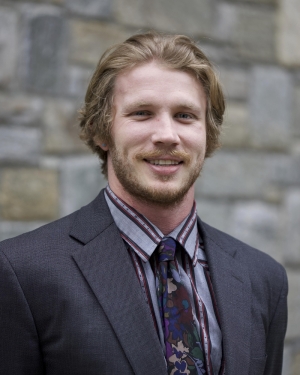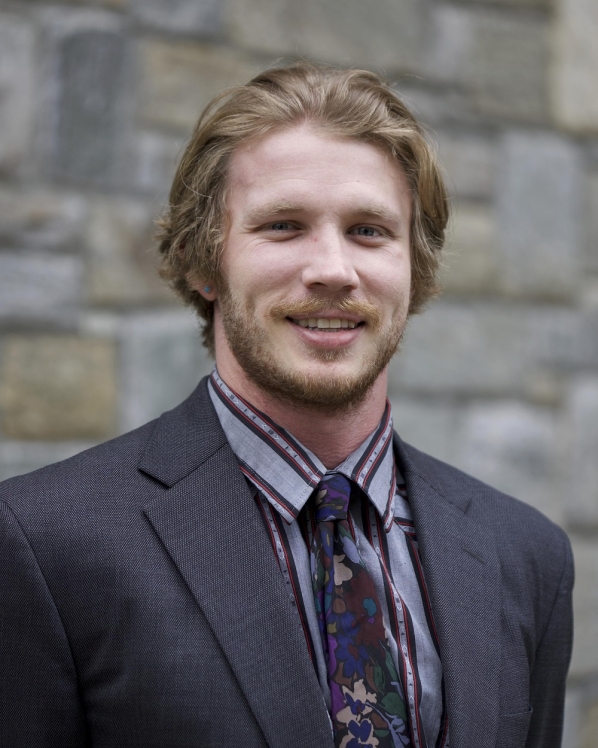This week, the IOHRM program shines our spotlight on our second-year student, Lukas Robertson. Lukas shares stories about his journey and provides advice for prospective students considering the program as he reflects on his experiences at Appalachian State.
Journey to IOHRM
In undergrad, Lukas pursued a degree in animal science with a minor in religious studies. With this degree, he was going to become a veterinarian, but after shadowing a vet in his senior year, he realized it wasn’t the right fit for him. He then utilized his knowledge of sociology and human behavior from his religious studies coursework to pivot to a different career path. After graduating, he worked at a company called Backcountry as a call center representative, where he began to notice the parallels between religious institutions and business structures, sparking an interest in improving workplace dynamics. Unfortunately, when he presented his ideas for workplace improvements, they did not take him seriously. From there, the desire to continue his education on workplace structures persisted and he began to look for graduate programs that didn’t require a psychology background. After speaking with the IOHRM program director, Dr. Tim Huelsman, and a second-year student, Lukas felt confident that App State was the right choice for him.
Exploring Interests as a Current Student
Within the program, Lukas was initially drawn to leadership development, then found an appreciation for performance management, leadership & employee development, and compensation. He clarifies that rather than having one favorite class, he enjoys seeing how all the course content connects to each other, allowing him to build a well-rounded understanding of IOHRM principles. For his summer internship, he worked at the App State student union, which allowed him to apply the IOHRM concepts he learned directly to the workplace. At the student union, he worked on projects like revamping performance management metrics, the onboarding processes, and rewriting job descriptions. Additionally, his involvement in the Society for HR Management (SHRM)’s consulting projects has provided real-world application opportunities as well. By taking on the role of president in SHRM, he restructured the organization to impact more students within the university.
Essential Skills and Insights Gained
When asked about essential skills needed to succeed in the IOHRM program, Lukas emphasized time management as the most important skill. However, he sees time management as being tied to other essential skills like self-awareness, critical thinking, and emotional regulation. Understanding one’s own stress levels and emotional responses is very important, since these factors can directly impact how productive and good at decision-making you are. Lukas also emphasizes that the ability to critically evaluate theories that are taught, rather than blindly accepting them is a key component of his training here. Self-confidence has also been a vital skill developed through frequent facilitations and presentations throughout classes. Maintaining a global perspective is also an important takeaway. Many IOHRM concepts are culture-dependent and having a broader understanding of the application is essential to applying it effectively. His religious studies background has helped him see the influence of different cultural and social structures on business and HR practices. Lastly, he lists adaptability as a crucial skill as the field is constantly evolving, requiring professionals to stay flexible and open to new ideas.
Advice for Prospective Students
For those considering the IOHRM path, Lukas encourages listening to his Spotify podcast to get to know the faculty and program. Given the rigorous nature of graduate programs, he recommends choosing a school that provides a supportive environment for mental clarity and personal well being. Being proactive about speaking with professors and current students can provide great insights. Also look into program outcomes, such as job placement rates after graduation and alumni career paths.
Looking Ahead
After graduation, Lukas aspires to find contentment in his future career, regardless of what it is. Having experienced uncertainty and a sense of drifting in the workforce in the past, he wants to graduate with a clearer sense of direction and purpose. His goal is to find a position where he feels supported and engaged, and feeling like it aligns with his values. For him, the cycle of struggling, learning, and growing in the IOHRM program has been invaluable. He believes that after overcoming the rigor of this program, future professional challenges will feel more manageable. Lukas’ final piece of advice for anyone considering a major life or career change is this: take action, there is never a perfect moment to make a move, but persistence and resilience will always pay off.
We appreciate Lukas for sharing his experiences and insights into his growth as both a student and a professional. We look forward to seeing his future achievements!

